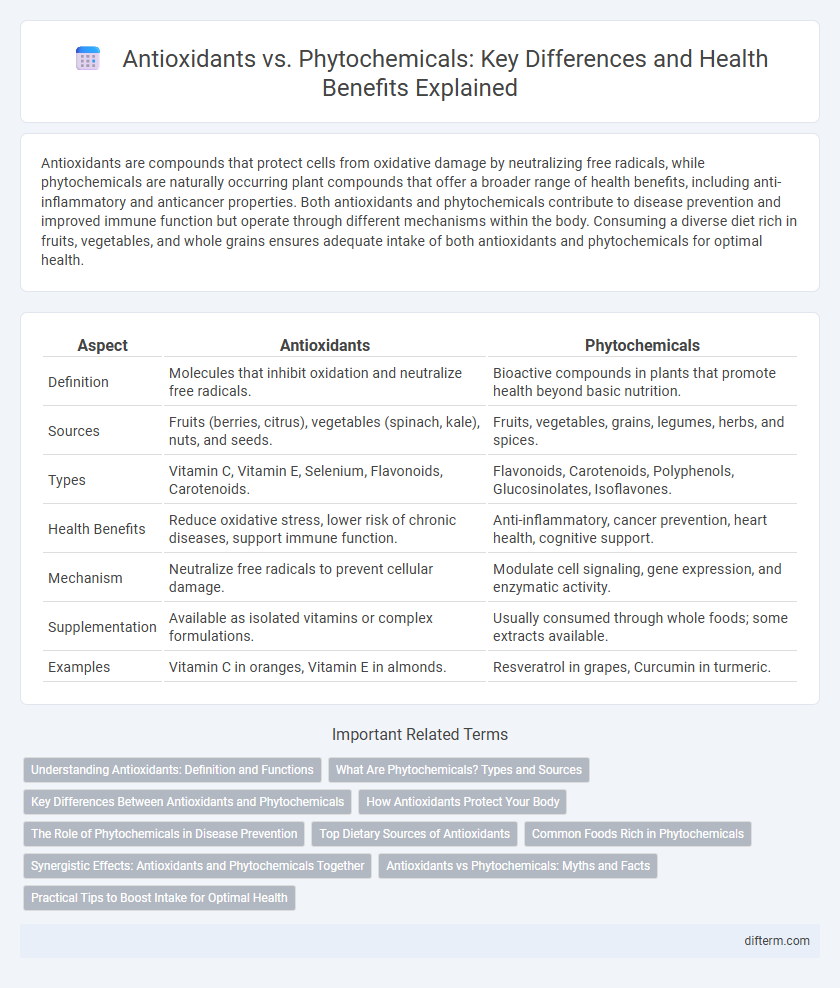Antioxidants are compounds that protect cells from oxidative damage by neutralizing free radicals, while phytochemicals are naturally occurring plant compounds that offer a broader range of health benefits, including anti-inflammatory and anticancer properties. Both antioxidants and phytochemicals contribute to disease prevention and improved immune function but operate through different mechanisms within the body. Consuming a diverse diet rich in fruits, vegetables, and whole grains ensures adequate intake of both antioxidants and phytochemicals for optimal health.
Table of Comparison
| Aspect | Antioxidants | Phytochemicals |
|---|---|---|
| Definition | Molecules that inhibit oxidation and neutralize free radicals. | Bioactive compounds in plants that promote health beyond basic nutrition. |
| Sources | Fruits (berries, citrus), vegetables (spinach, kale), nuts, and seeds. | Fruits, vegetables, grains, legumes, herbs, and spices. |
| Types | Vitamin C, Vitamin E, Selenium, Flavonoids, Carotenoids. | Flavonoids, Carotenoids, Polyphenols, Glucosinolates, Isoflavones. |
| Health Benefits | Reduce oxidative stress, lower risk of chronic diseases, support immune function. | Anti-inflammatory, cancer prevention, heart health, cognitive support. |
| Mechanism | Neutralize free radicals to prevent cellular damage. | Modulate cell signaling, gene expression, and enzymatic activity. |
| Supplementation | Available as isolated vitamins or complex formulations. | Usually consumed through whole foods; some extracts available. |
| Examples | Vitamin C in oranges, Vitamin E in almonds. | Resveratrol in grapes, Curcumin in turmeric. |
Understanding Antioxidants: Definition and Functions
Antioxidants are molecules that inhibit oxidation, a chemical reaction producing free radicals that can damage cells, proteins, and DNA. Key antioxidants include vitamins C and E, selenium, and beta-carotene, which neutralize free radicals and reduce oxidative stress. Their functions are critical in preventing chronic diseases such as cancer, cardiovascular disorders, and neurodegenerative conditions by maintaining cellular health.
What Are Phytochemicals? Types and Sources
Phytochemicals are naturally occurring compounds found in plants that provide health benefits beyond basic nutrition by protecting cells from damage and supporting the immune system. Major types of phytochemicals include flavonoids, carotenoids, polyphenols, and glucosinolates, each found in a range of fruits, vegetables, whole grains, nuts, and seeds. Rich sources of phytochemicals include berries, leafy greens, broccoli, tomatoes, and green tea, contributing to reduced inflammation and lower risk of chronic diseases.
Key Differences Between Antioxidants and Phytochemicals
Antioxidants are molecules that neutralize free radicals, preventing oxidative damage to cells, while phytochemicals are bioactive plant compounds that include antioxidants but also possess diverse health benefits beyond oxidation control. Antioxidants primarily function in protecting cellular components, whereas phytochemicals contribute to anti-inflammatory, immune-boosting, and cancer-preventive effects through multiple biochemical pathways. Key differences lie in their scope, with antioxidants being a subset of phytochemicals, and phytochemicals encompassing a broader range of health-promoting compounds found in fruits, vegetables, grains, and teas.
How Antioxidants Protect Your Body
Antioxidants protect your body by neutralizing free radicals, unstable molecules that can cause oxidative stress and cellular damage linked to chronic diseases such as cancer and heart disease. These molecules, including vitamins C and E, selenium, and flavonoids, help maintain cellular integrity by preventing DNA mutations and reducing inflammation. Consuming a diet rich in antioxidant-packed foods like berries, nuts, and green leafy vegetables supports the body's natural defense system and promotes overall health.
The Role of Phytochemicals in Disease Prevention
Phytochemicals, naturally occurring compounds in fruits and vegetables, play a crucial role in disease prevention by modulating cellular processes and reducing inflammation. Unlike antioxidants, which primarily neutralize free radicals, phytochemicals influence gene expression and enhance immune function, thereby lowering the risk of chronic diseases such as cancer, cardiovascular disease, and diabetes. Research highlights specific phytochemicals like flavonoids and carotenoids for their ability to inhibit tumor growth and improve endothelial function, emphasizing their importance in a balanced, disease-preventive diet.
Top Dietary Sources of Antioxidants
Top dietary sources of antioxidants include berries such as blueberries and strawberries, dark leafy greens like spinach and kale, and nuts including walnuts and almonds. These foods are rich in vitamin C, vitamin E, and flavonoids, which help neutralize free radicals and reduce oxidative stress. Consuming a variety of antioxidant-rich foods supports cellular health and may lower the risk of chronic diseases.
Common Foods Rich in Phytochemicals
Common foods rich in phytochemicals include berries, citrus fruits, cruciferous vegetables like broccoli and Brussels sprouts, and leafy greens such as spinach and kale. These plant-based compounds offer a variety of health benefits by neutralizing free radicals and supporting cellular health. Phytochemicals differ from antioxidants as they also contribute to anti-inflammatory processes and immune system regulation beyond simply combating oxidative stress.
Synergistic Effects: Antioxidants and Phytochemicals Together
Antioxidants and phytochemicals exhibit powerful synergistic effects by enhancing each other's ability to neutralize free radicals and reduce oxidative stress in the body. Combining diverse phytochemicals with antioxidants from sources like fruits, vegetables, and whole grains maximizes cellular protection and supports immune function more effectively than isolated compounds. Research indicates that dietary patterns rich in these bioactive substances correlate with lower risks of chronic diseases such as cardiovascular disease, cancer, and neurodegeneration.
Antioxidants vs Phytochemicals: Myths and Facts
Antioxidants and phytochemicals both play vital roles in promoting health by protecting cells from oxidative stress, but they are often misunderstood in popular discourse. While antioxidants neutralize free radicals directly to prevent cellular damage, phytochemicals include a broader category of plant compounds that can have antioxidant properties as well as other health benefits such as anti-inflammatory and hormone-regulating effects. Misconceptions arise when antioxidants are solely credited for health improvements, ignoring the multifunctional nature of phytochemicals and their synergistic impact on disease prevention.
Practical Tips to Boost Intake for Optimal Health
Incorporate a colorful variety of fruits and vegetables such as berries, spinach, and kale to maximize antioxidant and phytochemical intake for optimal health. Regular consumption of nuts, seeds, and green tea provides potent polyphenols and flavonoids that combat oxidative stress effectively. Utilize herbs like turmeric and garlic in daily cooking to enhance bioactive compounds intake, supporting immune function and reducing inflammation.
Antioxidants vs Phytochemicals Infographic

 difterm.com
difterm.com